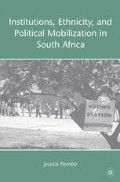Abstract
Should the rejection of ethnic mobilization still not seem noteworthy, consider the following facts. In late February 1999 the Inkatha Freedom Party launched its national election campaign in a stadium outside of Johannesburg. The rally introduced the party’s election manifesto and covered many issues, none of them either explicit or coded ethnic appeals. Buthelezi and all the speakers appeared in Western suits, not the tribal attire or the animal pelts they occasionally wear. No one on the podium carried a knobkerrie, sjambok, or any other “traditional” weapon. Most in the crowd wore urban street clothing, and only a small minority wore some form of traditional Zulu beading, headdress, or carried spears (outside the stadium).
Access this chapter
Tax calculation will be finalised at checkout
Purchases are for personal use only
Preview
Unable to display preview. Download preview PDF.
Notes
See Heather Deegan, The Politics of the New South Africa: Apartheid and After (New York: Pearson Education, 2001)
Timothy Sisk, Democratization in South Africa: The Elusive Social Contract (Princeton: Princeton University Press, 1995)
Allister Sparks, Tomorrow Is Another Country: The Inside Story of South Africa’s Road to Change (New York: Hill and Wang, 1995).
Marion Edmunds,“Party Lists Stay,” Weekly Mail and Guardian (South Africa), April 19, 1996
Mervyn Frost,“Preparing for Democracy in an Authoritarian State,” in Launching Democracy in South Africa: The First Open Election, April 1994, ed. R. W. Johnson and Lawrence Schlemmer (New Haven and London: Yale University Press, 1996).
Tom Lodge, South African Politics since 1994 (Cape Town and Johannesburg: David Phillip, 1999).
David Pottie,“The First Five Years of Provincial Government,” in Election’ 99 South Africa: From Mandela to Mbeki. ed. Andrew Reynolds (Cape Town: David Phillip; New York: St. Martin’s, 1999).
Idasa, Budget Watch, no 37 (October 10, 2001). In 2001, the Provincial Revenue Taxation Act was finally passed by the National Assembly, which set out some of the regulations that should pave the way for provinces to develop their own tax bases. There was much debate surrounding the passage of this bill, some of it pertaining to whether or not provinces needed the regulatory bill to be passed to initiate their own taxation legislation. For extended discussion, see Joachim Wehner, “Fiscal Federalism in South Africa,” Publius: The Journal of Federalism 30, no. 3 (Summer 2000): 47–72.
Calland, Richard, ed. The First Five Years: A Review of South Africa’s Democratic Parliament (Cape Town: Institute for Democracy in South Africa, 1999).
See J. D. Omer-Cooper, History of Southern Africa, 2nd ed. (Portsmouth, NH: Heinemann, 1994), especially 8-11.
G. H. L. Le May, The Afrikaners: An Historical Interpretation (Cambridge, MA and Oxford: Blackwell, 1995).
Gerhard Mare, Ethnicity and Politics in South Africa (New Jersey and London: Zed Books, 1993), 32–33.
In Afrikaans, the term often used for Coloureds, bruin mense, literally means brown people. Some Coloured people call themselves bruin Afrikaners (Peter Marias, “Too Long in the Twilight,” in Now that We Are Free: Coloured Communities in a Democratic South Africa, ed. Wilmot James, Daria Caliguire, and Kerry Cullinan Wilmot James [Boulder, CO: Lynne Rienner, 1996, 60]). Many others refer to “brown South Africans” and “brown communities.”
Hennie Kotzé, Culture, Ethnicity and Religion: South African Perceptions of Social Identity (Johannesburg: Konrad-Adenauer Stiftung, 1997), 8.
For an early proponent of the racial census idea, see R. W. Johnson,“The 1994 Election: Outcome and Analysis,” in Launching Democracy in South Africa, entire chapter, but especially 319. Johnson argued that the 1994 elections were pure racial census outcomes, while Giliomee argued that owing to primordial attachments, few voters were open to political persuasion (Hermann Giliomee, “South Africa’s Emerging Dominant Party System,” Journal of Democracy 9, no. 4 [1998]: 124–142). Reynolds and Lodge have both offered milder versions of the perspective in their works on elections in South Africa.
See Andrew Reynolds, ed., Election’ 94 South Africa: The First Open Election (New York: St. Martin’s, 1994) and Election’ 99 South Africa: From Mandela to Mbeki
Tom Lodge, Consolidating Democracy: South Africa’s Second Popular Election (Johannesburg: Witswatersrand University Press, 1999).
For a discussion of this dynamic and the limits to which it can be pushed, see Nicoli Nattrass and Jeremy Seekings, “‘Two Nations’? Race and Economic Inequality in South Africa Today,” Daedalus: Journal of the American Academy of Arts and Sciences 130, no. 1 (Winter 2001): 45–69.
Sampie Terreblanche, A History of Inequality in South Africa, 1652–2002 (Pietermarizburg, South Africa: University of Natal Press, 2002), and Carolyn Jenkins and Lynne Thomas,“The Changing Nature of Inequality in South Africa,” Working Paper No. 203 (United Nations University World Institute for Development Economics Research [UNU/WIDER], October 2000). For a vignette of what these dynamics actually look like, see, “The Cape of Poverty,” Mail and Guardian Online, http://www.mg.co.za/Content/13.asp?ap=14231 (accessed on May 16, 2003).
Copyright information
© 2009 Jessica Piombo
About this chapter
Cite this chapter
Piombo, J. (2009). South Africa’s Political Institutions and Social Divisions. In: Institutions, Ethnicity, and Political Mobilization in South Africa. Palgrave Macmillan, New York. https://doi.org/10.1057/9780230623828_3
Download citation
DOI: https://doi.org/10.1057/9780230623828_3
Publisher Name: Palgrave Macmillan, New York
Print ISBN: 978-1-349-38036-7
Online ISBN: 978-0-230-62382-8
eBook Packages: Palgrave Political & Intern. Studies CollectionPolitical Science and International Studies (R0)

